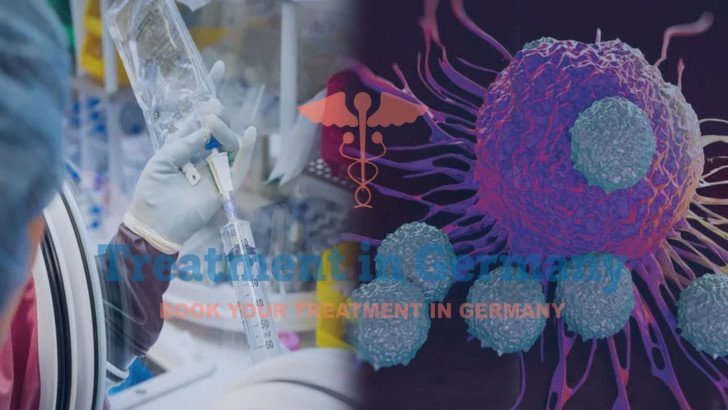
Unlike traditional vaccines, these therapeutic vaccines are designed to treat existing cancers by stimulating the immune system to recognize and attack cancer cells.
Personalized mRNA neoantigen vaccines, such as BioNTech’s Autogene Cevumeran, represent a transformative approach to cancer immunotherapy, offering hope for cancer patients with aggressive malignancies like pancreatic ductal adenocarcinoma (PDAC). Germany, a hub for innovative cancer treatments, leads in advancing these precision oncology solutions, attracting patients worldwide.
Personalized mRNA neoantigen vaccines target neoantigens, unique proteins produced by cancer cells due to tumor-specific mutations. Unlike traditional vaccines, these therapeutic vaccines are designed to treat existing cancers by stimulating the immune system to recognize and attack cancer cells. Autogene Cevumeran (BNT122, RO7198457), developed by BioNTech and Genentech, is an individualized immunotherapy that encodes up to 20 patient-specific neoantigens using mRNA technology. Delivered via lipoplex nanoparticles, it enhances immune activation by targeting T cells to destroy residual cancer cells post-surgery. German oncology centers leverage this innovative cancer treatment to address high-relapse cancers like PDAC, improving survival rates.
Cancer symptoms vary by malignancy but are critical for identifying candidates for Autogene Cevumeran. For PDAC, a highly lethal cancer, symptoms include:
These symptoms, common in advanced cancers, signal the need for diagnostic precision. German specialists use advanced tools to confirm PDAC or other malignancies, ensuring eligibility for personalized mRNA neoantigen vaccines.
Diagnostic Precision for Autogene Cevumeran
Accurate diagnostic precision is vital to identify neoantigens and tailor Autogene Cevumeran. Germany’s oncology centers employ cutting-edge diagnostic tools:
German oncologists and geneticists ensure rapid, accurate diagnostic precision, enabling individualized immunotherapy within weeks of tumor resection.
Germany’s Leadership in Autogene Cevumeran and Cancer Immunotherapy
Germany’s advanced cancer care ecosystem positions it as a pioneer in personalized mRNA neoantigen vaccines, with Autogene Cevumeran at the forefront of therapeutic advancements for cancer patients.
Mechanism of Autogene Cevumeran
Autogene Cevumeran harnesses mRNA technology to stimulate immune activation:
German immunologists ensure precise manufacturing and delivery, enhancing anti-tumor efficacy.
Integration with Combination Therapies
Autogene Cevumeran is often combined with other treatments to maximize patient outcomes:
This multidisciplinary cancer care, led by German oncologists, amplifies therapeutic advancements.
Clinical Trials: Driving Therapeutic Advancements
Germany’s role in clinical trials for cancer advances Autogene Cevumeran:
German oncology centers lead these trials, expanding applications for innovative cancer treatments.
Why Germany Excels in Personalized mRNA Neoantigen Vaccines
Germany offers unique advantages for cancer patients seeking Autogene Cevumeran:
Risk Factors and Prevention Strategies for Cancer
Preventing cancer recurrence supports Autogene Cevumeran’s efficacy. Risk factors for PDAC and other cancers include:
German specialists recommend regular screenings (PET-CT, CA 19-9), healthy diets, and smoking cessation to reduce disease risk.
Comprehensive Multidisciplinary Cancer Care
Germany’s multidisciplinary cancer care integrates Autogene Cevumeran with:
This holistic approach, led by German oncologists, optimizes anti-tumor efficacy.
Post-Treatment Support and Enhancing Quality of Life
After Autogene Cevumeran, German oncology centers provide comprehensive follow-up:
Germany’s patient-centric approach ensures sustained recovery and quality of life.
Challenges and Future Horizons
Personalized mRNA neoantigen vaccines face challenges, including neoantigen selection complexity, tumor immune evasion, and manufacturing timelines. German researchers address these through:
Future innovations, including self-amplifying mRNA and broader cancer applications, promise to advance cancer immunotherapy.
Conclusion
Germany’s leadership in personalized mRNA neoantigen vaccines, exemplified by Autogene Cevumeran, is revolutionizing cancer immunotherapy. By leveraging immune activation, clinical trials, and multidisciplinary cancer care, German oncology centers deliver tailored therapeutic advancements for cancer patients with PDAC and other malignancies. Supported by world-class specialists and cutting-edge technology, Germany ensures exceptional survival rates and quality of life. As a global pioneer in precision oncology, Germany offers hope through innovative cancer treatments, blending scientific breakthroughs with compassionate care.
🌍Why Patients Worldwide Prefer Our Medical Services in Germany – Key Benefits Explained:
Frequently Asked Questions
What is Autogene Cevumeran in cancer immunotherapy?
It’s a personalized mRNA neoantigen vaccine targeting up to 20 neoantigens to prevent cancer recurrence, offered at German oncology centers.
What cancer symptoms does Autogene Cevumeran address?
Symptoms like abdominal pain, weight loss, jaundice, and fatigue in PDAC or other cancers.
How is eligibility for Autogene Cevumeran determined in Germany?
Through tumor sequencing, PET-CT, blood tests, and biopsies for diagnostic precision.
Are clinical trials for Autogene Cevumeran available in Germany?
Yes, German oncology centers conduct clinical trials for PDAC, melanoma, and colorectal cancer.
Is follow-up care provided after Autogene Cevumeran treatment?
Yes, including monitoring, rehabilitation, and emotional wellness support.
How does Germany compare to the UK/US for mRNA vaccine therapy?
Germany excels in precision oncology, rapid manufacturing, and holistic care.
Can Autogene Cevumeran prevent cancer recurrence?
It induces T cell responses to delay recurrence, as shown in PDAC trials.
Does Germany support international cancer patients?
Hospitals in Germany offer language assistance, travel coordination, and emotional wellness programs.
What are the latest advancements in Autogene Cevumeran in Germany?
AI-driven neoantigen selection, novel lipoplex nanoparticles, and combination therapies.
How does Autogene Cevumeran differ from traditional cancer treatments?
Unlike chemotherapy, it’s an individualized immunotherapy targeting neoantigens for precise immune activation.
For more information or a free consultation, visit our contact us page.
Kindly complete the form below, and our dedicated team will reach out to you promptly. We look forward to connecting with you soon!
Trierer Straße, 56072 Koblenz, Germany

.webp)
 (1).webp)

.webp)
 (1).webp)


.webp)
 (1).webp)

.webp)
 (1).webp)
